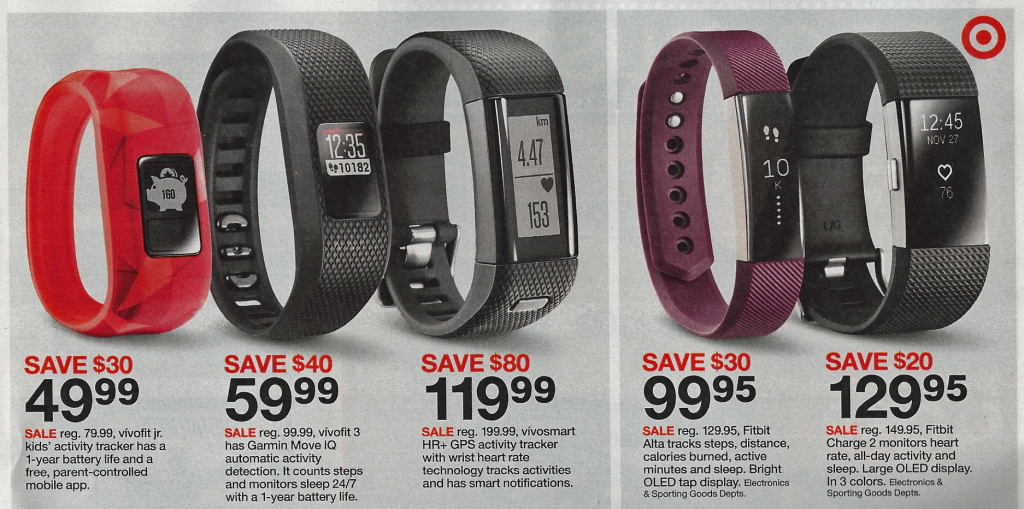 Thanksgiving is about gratitude, family and food, hopefully in abundance. In millions of American households, Thanksgiving has also come to mean holiday shopping in the form of deep discounts starting as early as 3 pm on Thanksgiving Day. Holiday shopping has become something of a competitive sport for value-motivated consumers, and fitness tracking devices will be a big seller for gift-giving. Think of this phenomenon as gifting connected and digital health for the holidays, and part of the morphing retail health landscape beyond the pharmacy and into Big Box, consumer electronics, and discount stores.
Thanksgiving is about gratitude, family and food, hopefully in abundance. In millions of American households, Thanksgiving has also come to mean holiday shopping in the form of deep discounts starting as early as 3 pm on Thanksgiving Day. Holiday shopping has become something of a competitive sport for value-motivated consumers, and fitness tracking devices will be a big seller for gift-giving. Think of this phenomenon as gifting connected and digital health for the holidays, and part of the morphing retail health landscape beyond the pharmacy and into Big Box, consumer electronics, and discount stores.
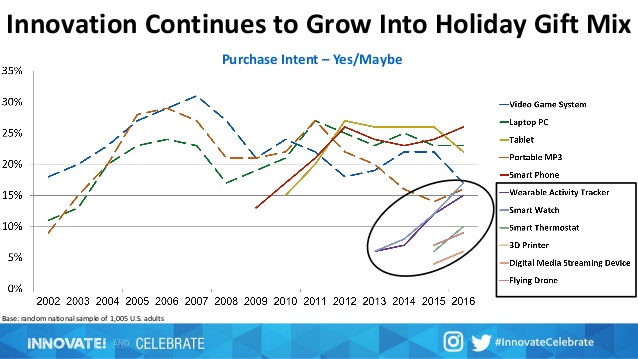 The Consumer Technology Association (CTA) published its forecast for electronics purchases at retail, which I covered here in the Health Populi post, All I Want for Christmas Is A Health Tracker. The line chart presents the CTA expectation that wearable activity trackers and smart watches are fast-growing categories in consumer electronics purchases (circled), with other electronics segments falling in demand.
The Consumer Technology Association (CTA) published its forecast for electronics purchases at retail, which I covered here in the Health Populi post, All I Want for Christmas Is A Health Tracker. The line chart presents the CTA expectation that wearable activity trackers and smart watches are fast-growing categories in consumer electronics purchases (circled), with other electronics segments falling in demand.
On Black Friday, the Fitbit Charge 2 is ubiquitously available at $129.95 at Best Buy, Sam’s Club, Target, and Walmart; and, at Kohl’s and Verizon for 4 cents more. Dick’s Sporting Goods has marked down the Fitbit Surge by $70, selling the watch for $179.98 as a Door Buster which also qualifies for a $20 gift card bonus, shown in the second ad. (Financial wellness is part of consumers’ overall definition of health, and Dick’s is playing to these athletically-inclined value shoppers).
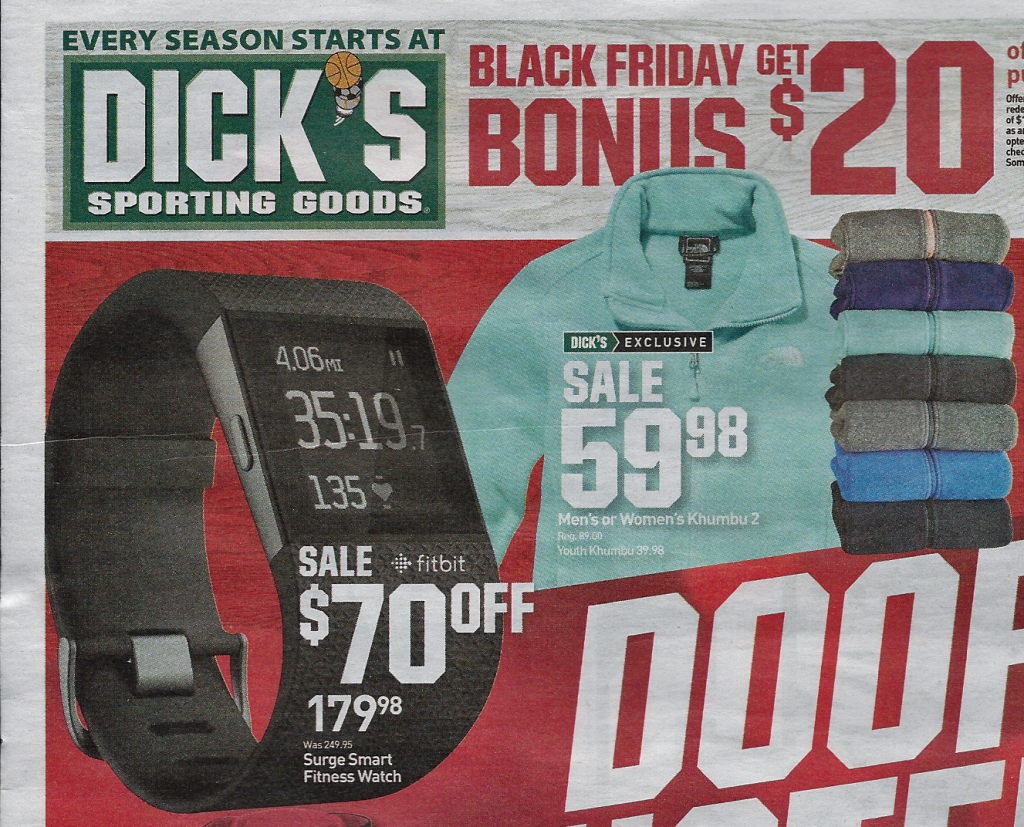 Why way for CyberMonday? Black Friday “doorbuster” deals can be found online even on Thanksgiving Day. Amazon is arguably the biggest destination for wearable tech purchases; their Black Friday deal with the deepest discount at 53% is a Garmin Vivosmart HR priced at $69.99. For the elite athlete in your life, Amazon also offers the Garmin Forerunner 920XT Tri-Bundle for $349.99, a 42% discount from the list price of $600. My personal favorite Withings Body Cardio scale is priced at $107.95, deeply discounted from the list price of $179.95, on Amazon on Thanksgiving Day: well-timed to remind me to mindfully ration today’s Yukon Gold mashed potatoes (with butter and cream), challah bread stuffing, and multiple homemade desserts.
Why way for CyberMonday? Black Friday “doorbuster” deals can be found online even on Thanksgiving Day. Amazon is arguably the biggest destination for wearable tech purchases; their Black Friday deal with the deepest discount at 53% is a Garmin Vivosmart HR priced at $69.99. For the elite athlete in your life, Amazon also offers the Garmin Forerunner 920XT Tri-Bundle for $349.99, a 42% discount from the list price of $600. My personal favorite Withings Body Cardio scale is priced at $107.95, deeply discounted from the list price of $179.95, on Amazon on Thanksgiving Day: well-timed to remind me to mindfully ration today’s Yukon Gold mashed potatoes (with butter and cream), challah bread stuffing, and multiple homemade desserts.
At the value-priced end of the market for newbies to health tracking, dozens of excellent deals can be found. I saw a Jawbone UP 2 activity tracker in grey for $25 on Walmart.com with free shipping; a Garmin Vivofit 3 tracker for $59.99 at Kohl’s (which also offers $15 of Kohl’s cash for every $50 spent); and, the Withings wireless blood pressure monitor at Best Buy for $69.99 (down from $99.99). Best Buy also offers the Fossil Q Grant Chronograph Smartwatch at 50% off — $87.50 from $175 for stainless steel, and $97.50 for rose gold.
Wearable tech and connected health in the home will be a growing part of health consumers’ lives going forward. Expect to hear more from me in the first week of January 2017 when I kick the tires on more new-new wearable health things at the CES (Consumer Electronics Show) in Vegas, and follow the hashtag #CES2017.
Health Populi’s Hot Points: Some retailers have recognized U.S. consumers’ retail shopping backlash, starting last year with the closure of REI and other stores who “sold” consumers on the idea not shopping on Thanksgiving and closing for store associates’ quality of family life. There is a segment of consumers who value this approach, and besides, they can shop online on Thanksgiving while their loved ones nap in post-L-tryptophan turkey eating numbness.
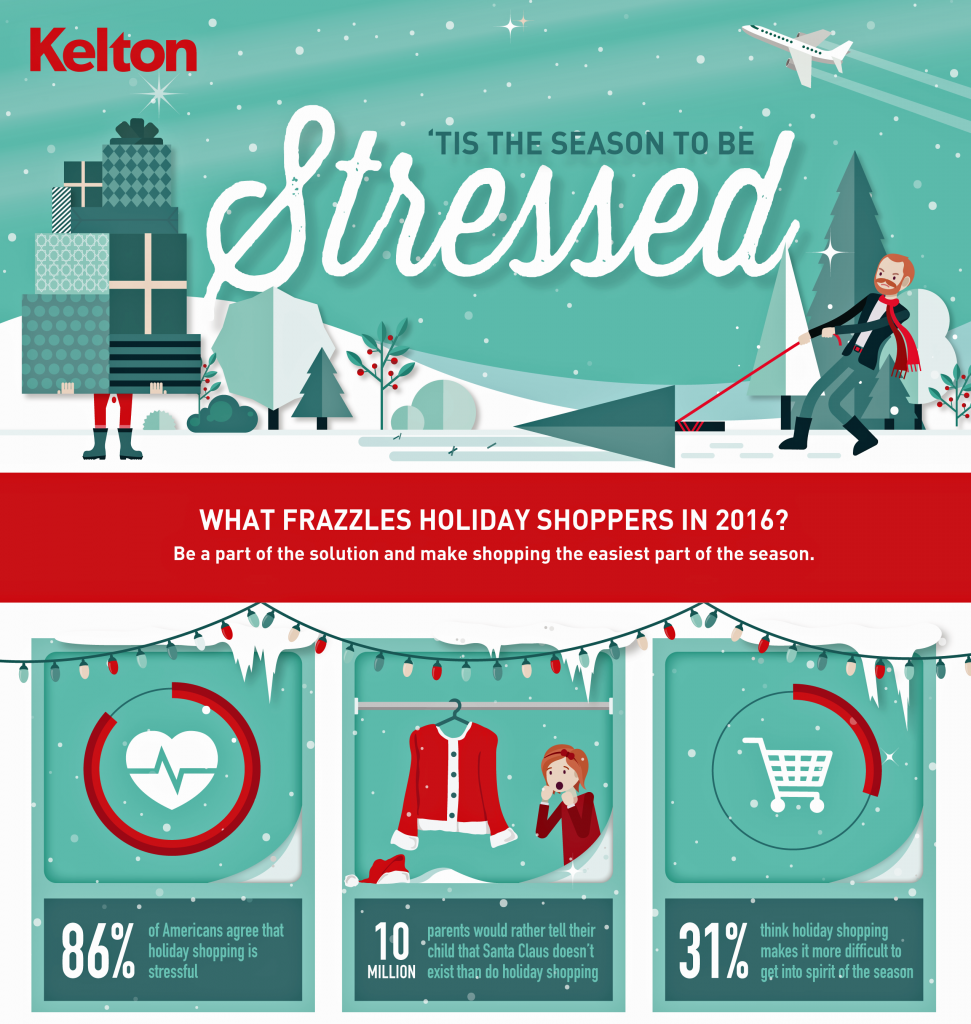 Consumers @retail can feel very stressed in the context of the go-go shopping season, which Kelton Global has quantified in a survey detailed in their infographic titled, “‘Tis the Season to be Stressed.” What stressed holiday shoppers in 2016? Three pain points plague consumers heading to retail destinations: planning what to buy, navigating crowds, and receiving shipped goods, Kelton found. Their advice to retailers: make it fun, keep it simple, stay savvy via social media and helpful apps. Finally, personalize the experience.
Consumers @retail can feel very stressed in the context of the go-go shopping season, which Kelton Global has quantified in a survey detailed in their infographic titled, “‘Tis the Season to be Stressed.” What stressed holiday shoppers in 2016? Three pain points plague consumers heading to retail destinations: planning what to buy, navigating crowds, and receiving shipped goods, Kelton found. Their advice to retailers: make it fun, keep it simple, stay savvy via social media and helpful apps. Finally, personalize the experience.
Sadly, 86% of Americans say that holiday shopping is stressful, and 31% think that shopping makes it more difficult to get into the spirit of the season.
And yet, people still do it.
In health and wellness, behavior change is hard to do, even when it comes to retail shopping at the holidays.


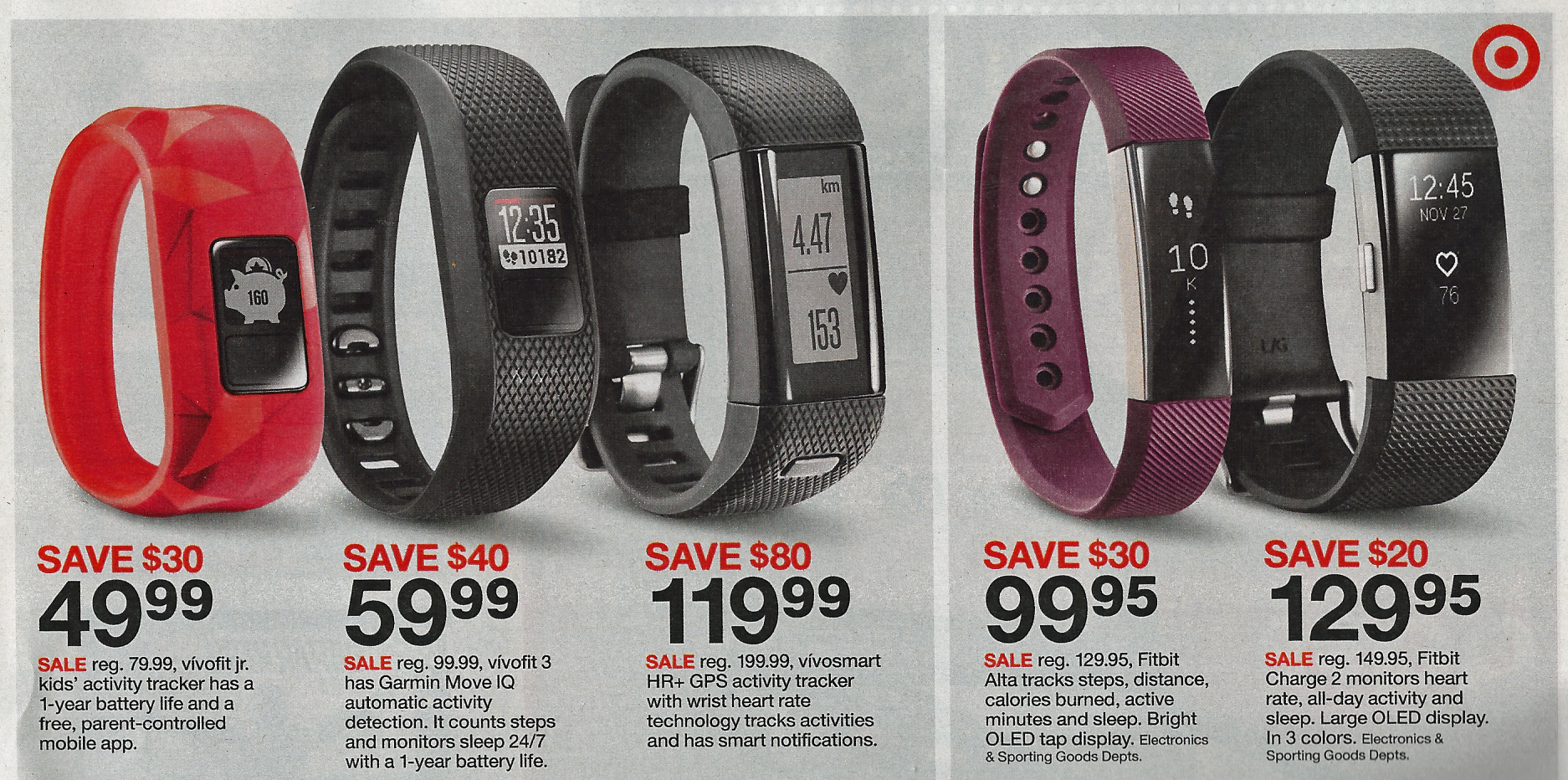


 Thank you,
Thank you,  As a proud Big Ten alum, I'm thrilled to be invited to meet with the OSU HSMP Alumni Society to share perspectives on health care innovation.
As a proud Big Ten alum, I'm thrilled to be invited to meet with the OSU HSMP Alumni Society to share perspectives on health care innovation. I was invited to be a Judge for the upcoming CES 2025 Innovation Awards in the category of digital health and connected fitness. So grateful to be part of this annual effort to identify the best in consumer-facing health solutions for self-care, condition management, and family well-being. Thank you, CTA!
I was invited to be a Judge for the upcoming CES 2025 Innovation Awards in the category of digital health and connected fitness. So grateful to be part of this annual effort to identify the best in consumer-facing health solutions for self-care, condition management, and family well-being. Thank you, CTA!